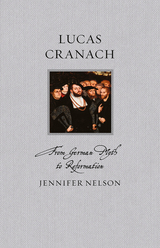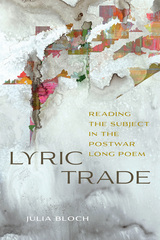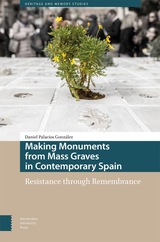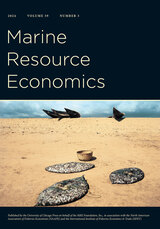18 start with F start with F
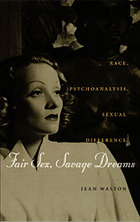
Charting the fantasies of racial difference in these women’s writings, Walton establishes that race—particularly during this period—was inseparable from accounts of gender and sexuality. While arguing that these women remained notably oblivious to the racial meanings embedded in their own attempts to rearticulate feminine sexuality, Walton uses these very blindspots to understand how race and sex are deeply imbricated in the constitution of subjectivity. Challenging the notion that subjects acquire gender identities in isolation from racial ones, she thus demonstrates how white-centered psychoanalytic theories have formed the basis for more contemporary feminist and queer explorations of fantasy, desire, power, and subjectivity.
Fair Sex, Savage Dreams will appeal to scholars of psychoanalysis, literary and cinematic modernism, race studies, queer theory, feminist theory, and anthropology.
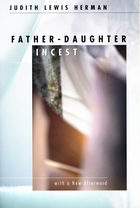
Through an intensive clinical study of forty incest victims and numerous interviews with professionals in mental health, child protection, and law enforcement, Judith Herman develops a composite picture of the incestuous family. In a new afterword, Herman offers a lucid and thorough overview of the knowledge that has developed about incest and other forms of sexual abuse since this book was first published.
Reviewing the extensive research literature that demonstrates the validity of incest survivors' sometimes repressed and recovered memories, she convincingly challenges the rhetoric and methods of the backlash movement against incest survivors, and the concerted attempt to deny the events they find the courage to describe.

It has been said that fathers are a biological necessity but a social accident. When Ross Parke first wrote about fathers for the Developing Child series, American culture seemed to adhere strongly to the stereotype of Dad the breadwinner, pacing outside the delivery room and peeking through the nursery window, and Mom the homemaker, warming bottles and changing diapers. Simple—in fact, a bit too simple. In the intervening years the conventional image of the uninvolved father has given way to a new stereotype: the father who takes an active part in rearing his children.
The dramatic technological, economic, and ideological changes in society over the past several decades have reconfigured the nuclear family and redefined the role of fathers. More women now work outside the home; fewer families can depend on an extended network of relatives for help with childcare; more divorced fathers assume or share custody of their children. Fathers have become partners in parenthood, wielding a more direct influence on their children’s development. But, Parke asks, is the new ideal of fathers—participating in childbirth and sharing in the care and feeding of their children—any more accurate than the earlier uninvolved father stereotype?
Social scientists have long ignored fathers, focusing on mothers as the significant figure in infant development. But research is showing that maternal caretaking is not biologically fixed, nor are fathers necessarily restricted to a secondary role in childcare. Turning away from well-worn theories in favor of direct observation, modern studies have revealed a substantial amount about how fathers behave with their children, how this behavior differs from maternal behavior, and how it affects children.
In this new book, Parke considers the father–child relationship within the “family system” and the wider society. Using the “life course” view of fathers that has emerged in recent years, he demonstrates that men enact their fatherhood in a variety of ways in response to their particular social and cultural circumstances. And while it is becoming clear that fathers play an important role in their children’s lives, it is also becoming clear that fathering is good for men.
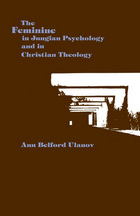
Jung focuses on the human person and sees as central its mixture of masculine and feminine elements. In a time when so much is asserted and written about women in society—their rights, roles, identities, needs, and contributions—it is especially significant that Jung asserts the existence of the feminine as a key element, not only in women but in men as well. No less contested are the roles and identities of Christians. Ulanov brings into focus the deep and fascinating connections between theology and psychology.
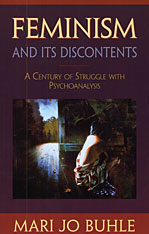
With Sigmund Freud notoriously flummoxed about what women want, any encounter between psychoanalysis and feminism would seem to promise a standoff. But in this lively, often surprising history, Mari Jo Buhle reveals that the twentieth century’s two great theories of liberation actually had a great deal to tell each other. Starting with Freud’s 1909 speech to an audience that included the feminist and radical Emma Goldman, Buhle recounts all the twists and turns this exchange took in the United States up to the recent American vogue of Jacques Lacan. While chronicling the contributions of feminism to the development of psychoanalysis, she also makes an intriguing case for the benefits psychoanalysis brought to feminism.
From the first, American psychoanalysis became the property of freewheeling intellectuals and popularists as well as trained analysts. Thus the cultural terrain that Buhle investigates is populated by literary critics, artists and filmmakers, historians, anthropologists, and sociologists—and the resulting psychoanalysis is not so much a strictly therapeutic theory as an immensely popular form of public discourse. She charts the history of feminism from the first wave in the 1910s to the second in the 1960s and into a variety of recent expressions. Where these paths meet, we see how the ideas of Freud and his followers helped further the real-life goals of a feminism that was a widespread social movement and not just an academic phenomenon. The marriage between psychoanalysis and feminism was not pure bliss, however, and Buhle documents the trying moments; most notably the “Momism” of the 1940s and 1950s, a remarkable instance of men blaming their own failures of virility on women.
An ambitious and highly engaging history of ideas, Feminism and Its Discontents brings together far-flung intellectual tendencies rarely seen in intimate relation to each other—and shows us a new way of seeing both.
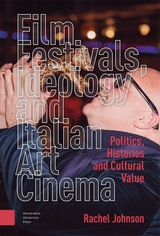
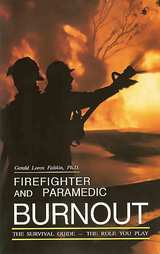
Firefighter and Paramedic Burnout was the first comprehensive book dealing with the recognition and treatment of burnout among firefighter and paramedic personnel. Today, this standard still serves to provide readers with a system of identification of early warning signs of excessive stress, its personal and social consequences, and interventions that have been proven to assist firefighters and their family members to return to a state of health and productivity.
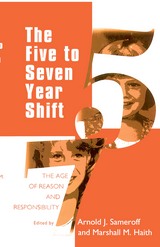
Leading researchers in neurology, sociology, anthropology, education, and psychology assess what is now commonly known as the five to seven year shift. They consider how development is influenced by changes in neurobiological subsystems; cognition, emotion, and self-concept; concerns with peers and families; and school and cultural practices. They find that important transitions in behavior and environment do take place in this period, and are best described in terms of the qualitative increase in complexity due to interactions among ecological systems.
This volume increases our understanding of both child development and the study and treatment of children at home and at school. It will interest researchers, clinicians, and students of psychology and education.
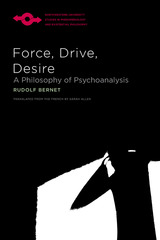
Rereading the long history of metaphysics (or at least a few of its key moments) in light of psychoanalytic inquiries into the nature and function of drive and desire also allows for a rewriting of the history of philosophy. Specifically, it allows Bernet to bring to light a different history of metaphysics, one centered less on Aristotelian substance (ousia) and more on the concept of dunamis—a power or potentiality for a realization toward which it strives with all its might. Relating human drives to metaphysical forces also bears fruit for a renewed philosophy of life and subjectivity.
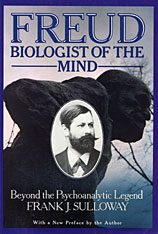
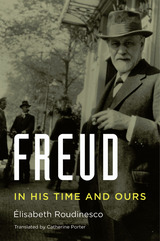
Élisabeth Roudinesco offers a bold and modern reinterpretation of the iconic founder of psychoanalysis. Based on new archival sources, this is Freud’s biography for the twenty-first century—a critical appraisal, at once sympathetic and impartial, of a genius greatly admired and yet greatly misunderstood in his own time and in ours.
Roudinesco traces Freud’s life from his upbringing as the eldest of eight siblings in a prosperous Jewish-Austrian household to his final days in London, a refugee of the Nazis’ annexation of his homeland. She recreates the milieu of fin de siècle Vienna in the waning days of the Habsburg Empire—an era of extraordinary artistic innovation, given luster by such luminaries as Gustav Klimt, Stefan Zweig, and Gustav Mahler. In the midst of it all, at the modest residence of Berggasse 19, Freud pursued his clinical investigation of nervous disorders, blazing a path into the unplumbed recesses of human consciousness and desire.
Yet this revolutionary who was overthrowing cherished notions of human rationality and sexuality was, in his politics and personal habits, in many ways conservative, Roudinesco shows. In his chauvinistic attitudes toward women, and in his stubborn refusal to acknowledge the growing threat of Hitler until it was nearly too late, even the analytically-minded Freud had his blind spots. Alert to his intellectual complexity—the numerous tensions in his character and thought that remained unresolved—Roudinesco ultimately views Freud less as a scientific thinker than as the master interpreter of civilization and culture.
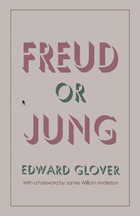

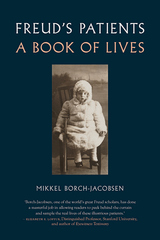
Everyone knows the characters described by Freud in his case histories: “Dora,” the “Rat Man,” the “Wolf Man.” But what do we know of the people, the lives behind these famous pseudonyms: Ida Bauer, Ernst Lanzer, Sergius Pankejeff? Do we know the circumstances that led them to Freud’s consulting room, or how they fared—how they really fared—following their treatments? And what of those patients about whom Freud wrote nothing, or very little: Pauline Silberstein, who threw herself from the fourth floor of her analyst’s building; Elfriede Hirschfeld, Freud’s “grand-patient” and “chief tormentor;” the fashionable architect Karl Mayreder; the psychotic millionaire Carl Liebmann; and so many others? In an absorbing sequence of portraits, Mikkel Borch-Jacobsen offers the stories of these men and women—some comic, many tragic, all of them deeply moving. In total, thirty-eight lives tell us as much about Freud’s clinical practice as his celebrated case studies, revealing a darker and more complex Freud than is usually portrayed: the doctor as his patients, their friends, and their families saw him.
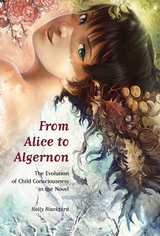
By examining the connection between authors and trends in child psychology, author Holly Blackford explains why many modern novels began to focus on child cognition as a site for intellectual and artistic exploration. In each chapter of this book, select novels of the late-nineteenth or twentieth century are paired with a specific moment or movement from the history of developmental psychology. Novels such as Mark Twain’s Huckleberry Finn and Henry James’s What Maisie Knew, or Radclyffe Hall’s less-canonical The Well of Loneliness and even Mark Haddon’s The Curious Incident of the Dog in the Night-Time, showcase major questions about human epistemology through their child characters. From Lewis Carroll’s Alice and her looking-glass to Richard Wright’s Bigger Thomas and the murder of Mary Dalton to the chaotic Neverland—symbolizing the unmappable child’s brain—a literary tradition of child consciousness has emerged as an experimental site for the unstable concepts of evolution, civilization, and development.
By situating literature about children within concurrent psychological discourses, Blackford demonstrates how the modern novel contributed to the world’s understanding of the boundless wonders and discernible limits of child consciousness.

The science of mind been plagued by intractable philosophical puzzles, chiefamong them the distortions of memory and therelation between mind and body. SigmundFreud's clinical practice forced him to grapplewith these problems, and out of that strugglepsychoanalysis emerged.
From Freud's Consulting Room charts the development of his ideasthrough his clinical work, the successes and failures of his most dramatic and significant case histories, and the creation of a discipline recognizably distinct from its neighbors.
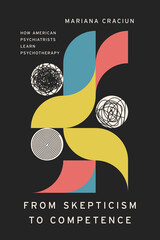
While many medical professionals can physically examine the body to identify and understand its troubles—a cardiologist can take a scan of the heart, an endocrinologist can measure hormone levels, an oncologist can locate a tumor—psychiatrists have a much harder time unlocking the inner workings of the brain or its metaphysical counterpart, the mind.
In From Skepticism to Competence, sociologist Mariana Craciun delves into the radical uncertainty of psychiatric work by following medical residents in the field as they learn about psychotherapeutic methods. Most are skeptical at the start. While they are well equipped to treat brain diseases through prescription drugs, they must set their expectations aside and learn how to navigate their patients’ minds. Their instructors, experienced psychotherapists, help the budding psychiatrists navigate this new professional terrain by revealing the inner workings of talk and behavioral interventions and stressing their utility in a world dominated by pharmaceutical treatments. In the process, the residents examine their own doctoring assumptions and develop new competencies in psychotherapy. Exploring the world of contemporary psychiatric training, Craciun illuminates novice physicians’ struggles to understand the nature and meaning of mental illness and, with it, their own growing medical expertise.
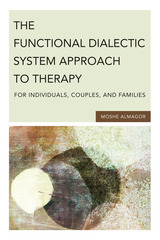
The functional dialectic system approach to therapy has been widely embraced and is now used internationally, with individuals and couples as well as with families. It differs substantially from the common psychotherapeutic models that have prevailed in the West for more than a century. According to the system model, an individual who is in treatment is not considered to be the primary focus of interest but is seen instead as part of a social context, the network of relationships that play significant roles in his or her life.
In this book, Moshe Almagor offers a comprehensive view of the contemporary system approach—from theory to practice—and shows how it can be applied to a variety of psychological problems and in a variety of therapeutic modes. The system approach to therapy concentrates on the present situation of a client, aware that people are always in transition yet seeking order, safety, belonging, and identity. Their behavior is thus goal oriented and functional. The principles of dialectics assert that everything includes its opposite, that there is an ongoing conflict between the poles, and that this inevitable conflict creates pressure that leads to a continuous alteration.
These principles, thoroughly explained in the book and practically illustrated by case examples drawn from the author’s own practice, show how the system approach is optimistic in its orientation and is designed to help clients change their lives by broadening their understanding of themselves, their situations, and their options.
READERS
Browse our collection.
PUBLISHERS
See BiblioVault's publisher services.
STUDENT SERVICES
Files for college accessibility offices.
UChicago Accessibility Resources
home | accessibility | search | about | contact us
BiblioVault ® 2001 - 2024
The University of Chicago Press


